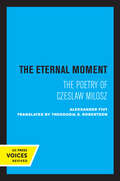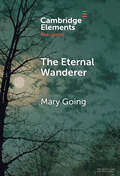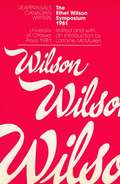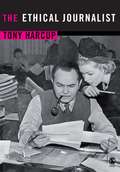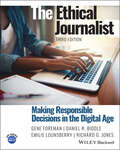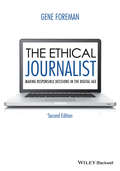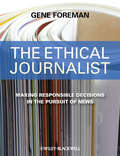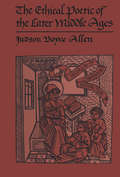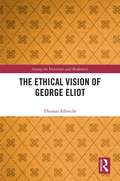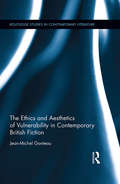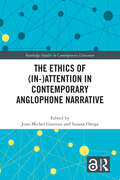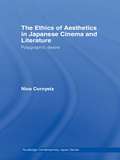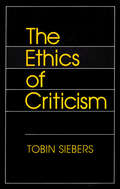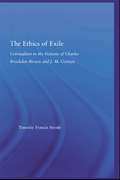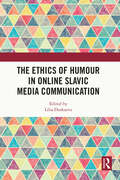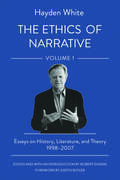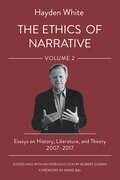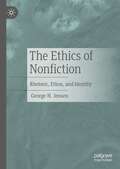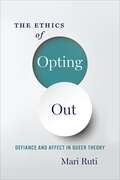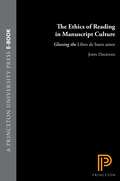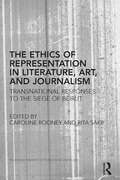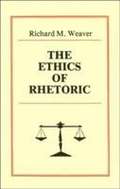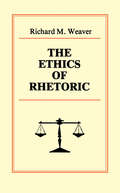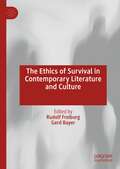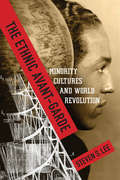- Table View
- List View
The Eternal Moment: The Poetry of Czeslaw Milosz
by Aleksander FiutAleksander Fiut's study of the poetry of Nobel Laureate Czeslaw Milosz is the first comprehensive examination of the artistic and philosophical dimensions of this remarkable oeuvre. The author refutes such easy categorizations of Milosz as "the poet of Poland," "the poet of history," "the poet of the Holocaust." He examines instead such crucial problems as Milosz's search for the essence of human nature, irreducible to historical, social, and biological categories; Milosz's reflection on the erosion of the Christian imagination, which has resulted in a fundamental gap between the individual's inner life and the image of humanity formed by scientific theories; his efforts to rebuild the anthropocentric vision of the world, while acknowledging the elements that have undermined it; and finally, his attempt to recreate in his poetry a language that is both poetic and philosophical. The Eternal Moment originally appeared in Polish in 1987. This version, which quotes extensively from Milosz's Collected Poems, is the first thorough introduction for English-speaking readers to this major poet. This title is part of UC Press's Voices Revived program, which commemorates University of California Press's mission to seek out and cultivate the brightest minds and give them voice, reach, and impact. Drawing on a backlist dating to 1893, Voices Revived makes high-quality, peer-reviewed scholarship accessible once again using print-on-demand technology. This title was originally published in 1990.
The Eternal Wanderer: Christian Negotiations in the Gothic Mode (Elements in the Gothic)
by Mary GoingThe Eternal Wanderer: Christian Negotiations in the Gothic Mode provides new ways of reading the Gothicisation of the Wandering Jew. It argues that early Gothic writing conjured iterations of this figure that reimagine and revise him, adding Gothic layers to a popular Christian myth that refuses to die. Drawing on the work of Carol Margaret Davison, Lisa Lampert-Weissig and Galit Hasan-Roken and Alan Dundes, whose studies trace the myth's development across history, folklore and literature, this Element studies the figure as an antisemitic, palimpsestic Derridean spectre and establishes early Gothic writing as a significant development in his continued spectral existence. By reading the production of the Wandering Jew in conversation with his historical and theological contexts, and employing theoretical traditions of spectralisation according to Jacques Derrida and Steven F. Kruger, this Element provides a dedicated account of Gothic iterations of this figure and examines its alchemical, Faustian and theological figurations.
The Ethel Wilson Symposium
by Lorraine McmullenThe book, The Ethel Wilson Symposium 1981, is one of the symposium series started in 1973 as a means of directing the attention of scholars to Canadian authors meriting reassessment.
The Ethical Journalist
by Tony Harcup"As one of the main scriptwriters of the two internal BBC training sessions which were produced following the Hutton inquiry, I can heartily recommend this book." - Peter Stewart, BBC Training Department "Packed with illustrations of journalistic heroism and skulduggery... This is an engaging and useful reference book and should become essential reading for serious students of journalism and for those who practise it." - Times Higher Education Supplement "A must-read for all journalists - be they reporters, editors or bloggers. It is both a straightforward explanation of ethical dilemmas using real-life examples and a subtle commentary on the state of British journalism." - British Journalism Review "This engaging nd accessible book cannot fail to inspire those who want to be good journalists in every sense of the word." - Journalism Practice Everything that journalists do has ethical implications, and in this book Tony Harcup explores the range of issues likely to confront those studying journalism or training to become journalists. The starting point for this engaging and innovative book is that ethical journalism is good journalism. Building on the reflective and questioning approach of the author's acclaimed Journalism: Principles and Practice, this book discusses journalists' personal anecdotes alongside relevant critical studies by academics. Original interviews include Andrew Gilligan on his meeting with weapons expert Dr David Kelly and Ryan Parry on being an undercover reporter in Buckingham Palace. Informed by new research and the author's own experience within mainstream and alternative journalism, The Ethical Journalist addresses topics such as trust, the public interest, deception, news values, source relationships, crime reporting, regulation and the Hutton inquiry. This exciting new title discusses ethics as fundamental rather than as a set of problems or an added extra, and it should become essential reading for everyone interested in journalism.
The Ethical Journalist: Making Responsible Decisions in the Digital Age
by Gene Foreman Daniel R. Biddle Emilie Lounsberry Richard G. JonesThe Ethical Journalist Praise for the Third Edition of The Ethical Journalist “A riveting examination of journalism ethics, updated for the seismic change that is now an industry constant. The Ethical Journalist is written to fortify journalism students, but real-life examples of everything from faked photographs to reporting on presidential lies make it valuable to all of us who care about the news.”ANN MARIE LIPINSKI, CURATOR OF THE NIEMAN FOUNDATION AT HARVARD UNIVERSITY AND FORMER EDITOR OF THE CHICAGO TRIBUNE Praise for the Earlier Editions “The book is superb — the definitive work on journalism ethics and practices. It should be a basic text in every school of journalism.”GENE ROBERTS, FORMER EXECUTIVE EDITOR OF THE PHILADELPHIA INQUIRER AND FORMER MANAGING EDITOR OF THE NEW YORK TIMES “At a time when the internet has turned journalism inside out and blown up long-held traditions, the need for media ethics is even more critical. This is the book to help guide students and the rest of us through the revolution.”ALICIA C. SHEPARD, FORMER NPR OMBUDSMAN The third edition of The Ethical Journalist is a comprehensive examination of current issues in the field of journalism ethics, researched and written by four journalists with experience in both the newsroom and the classroom. It gives students and professionals the tools they need to navigate the challenges of journalism today, first explaining the importance of ethics in journalism and then putting a decision-making strategy to work. The text is supplemented by case studies and essays, and two companion websites provide additional materials for educators and a forum for all users to discuss new topics in journalism ethics as they arise.
The Ethical Journalist: Making Responsible Decisions in the Digital Age
by Gene ForemanThis new edition of a well-regarded, student-friendly textbook for journalism ethics has been extensively revised and updated to meet the needs of the 21st century journalist working in the digital age. Educates aspiring journalists on ethical decision-making, with coverage of key applied issues such as the principles of fairness and accuracy, the duty of verification, the role of social media, the problems of plagiarism, fabrication, and conflicts of interest, business issues that affect journalism ethics, and questions relating to source relationships, privacy, and deception in reporting Includes extensive revisions to the majority of chapters, as well as six new “Point of View” essays, eight new case studies, and a full glossary Brings together the authoritative, engaging voice of a veteran journalist, the viewpoints of distinguished scholars and print, broadcast, and digital practitioners, and insights from complex, real-world case studies Supplemented by an annually updated companion website with resources for teachers and students, including: links to current articles discussing the subjects covered in each of the book’s chapters, and a teachers’ guide that offers sample syllabi, discussion guides, PowerPoint slides, sample quiz and exam questions, and links to audiovisual material
The Ethical Journalist: Making Responsible Decisions in the Pursuit of News
by Gene ForemanThe Ethical Journalist gives aspiring journalists the tools they need to make responsible professional decisions. Provides a foundation in applied ethics in journalism Examines the subject areas where ethical questions most frequently arise in modern practice Incorporates the views of distinguished print, broadcast and online journalists, exploring such critical issues as race, sex, and the digitalization of news sources Illustrated with 24 real-life case studies that demonstrate how to think in 'shades of gray' rather than 'black and white' Includes questions for class discussion and guides for putting important ethical concepts to use in the real world Accompanying website includes model course schedules, discussion guides, PowerPoint slides, sample quiz and exam questions and links to additional readings online: www.wiley.com/go/foreman
The Ethical Poetic of the Later Middle Ages
by Judson Boyce AllenThis study of the definition of literature in the late medieval period is based on manuals of writing and on literary commentary and glosses. It defines a method of reading which may now profitably explain medieval texts, and identifies new primary medieval evidence which may ground and guide new reading. Allen chooses texts whose commentary tradition provides the greatest opportunity for completeness. The most important of these is Ovid's Metamorphoses. Medieval readings of Ovid bring into focus a number of major literary questions--the problems of fable and fiction, of unity imposed by miscellany poetry, of allegorical commentary, and of Christian use of pagan culture--all in connection with text which furnished medieval authors with more stories than any other single source except possibly the Bible. Allen also studies commentaries on the Consolation of Philosophy of Boethius, the Thebaid of Statius, the De nuptiis of Martianus Capella, the medieval Christian hymn-book, and the Poetria nova of Geoffrey of Vinsauf. Together these texts represent the range of medieval literature--a literature which, Allen concludes, was taken as direct ethical discourse, logically conducted and artfully organized within a system of language that also assimilated the natural world and sought to absorb its audience.
The Ethical Vision of George Eliot: Communion and Difference (Among the Victorians and Modernists)
by Thomas AlbrechtThe Ethical Vision of George Eliot is one of the first monographs devoted entirely to the ethical thought of George Eliot, a profoundly significant, influential figure not only in nineteenth-century English and European literature, nineteenth-century women’s writing, the history of the novel, and Victorian intellectual culture, but also in the field of literary ethics. Ethics are a predominant theme in Eliot’s fictional and non-fictional writings. Her ethical insights and ideas are a defining element of her greatness as an artist and novelist. Through meticulous close readings of Eliot’s fiction, essays, and letters, The Ethical Vision of George Eliot presents an original, complex definition of her ethical vision as she developed it over the course of her career. It examines major novels like Adam Bede, Middlemarch, and Daniel Deronda; many of Eliot’s most significant essays; and devotes two entire chapters to Eliot’s final book Impressions of Theophrastus Such, an idiosyncratic collection of character sketches that Eliot scholars have heretofore generally overlooked or ignored. The Ethical Vision of George Eliot demonstrates that Eliot defined her ethical vision alternately in terms of revealing and strengthening a fundamental human communion that links us to other persons, however different and remote from ourselves; and in terms of recognizing and respecting the otherness of other persons, and of the universe more generally, from ourselves. Over the course of her career, Eliot increasingly transitions from the former towards the latter imperative, but she also considerably complicates her conception of otherness, and of what it means to be ethically responsible to it.
The Ethics and Aesthetics of Vulnerability in Contemporary British Fiction (Routledge Studies in Contemporary Literature)
by Jean-Michel GanteauThis book visits vulnerability in contemporary British fiction, considering vulnerability in its relation to poetics, politics, ethics, and trauma. Vulnerability and risk have become central issues in contemporary culture, and artistic productions have increasingly made it their responsibility to evoke various types of vulnerabilities, from individual fragilities to economic and political forms of precariousness and dispossession. Informed by trauma studies and the ethics of literature, this book addresses such issues by focusing on the literary evocations of vulnerability and analyzing various aspects of vulnerable form as represented and performed in British narratives, from contemporary classics by Peter Ackroyd, Pat Barker, Anne Enright, Ian McEwan, and Jeanette Winterson, to less canonical texts by Nina Allan, Jon McGregor, and N. Royle. Chapters on romance, elegy, the ghost story, and the state-of-the-nation novel draw on a variety of theoretical approaches from the fields of trauma studies, affect theory, the ethics of alterity, the ethics of care, and the ethics of vulnerability, among others. Showcasing how the contemporary novel is the privileged site of the expression and performance of vulnerability and vulnerable form, the volume broaches a poetics of vulnerability based on categories such as testimony, loss, unknowing, temporal disarray, and performance. On top of providing a book-length evocation of contemporary fictions of vulnerability and vulnerable form, this volume contributes significantly to considerations of the importance of Trauma Studies to Contemporary Literature.
The Ethics of (Routledge Studies in Contemporary Literature)
by Susana Onega Jean-Michel GanteauThis volume argues that contemporary narratives evince a great deal of resilience by promoting an ecology of attention based on poetic options that develop an ethics of the particularist type. The contributors draw on critical and theoretical literature hailing from various fields: including psychology and sociology, but more prominently phenomenology, political philosophy, analytical philosophy (essentially Ordinary Language Philosophy), alongside the Ethics of Care and Vulnerability. This volume is designed as an innovative contribution to the nascent field of the study of attention in literary criticism, an area that is full of potential. Its scope is wide, as it embraces a great deal of the Anglophone world, with Britain, Ireland, the USA, but also Australia and even Malta. Its chapters focus on well-established authors, like Kazuo Ishiguro (whose work is revisited here in a completely new light) or more confidential ones like Melissa Harrison or Sarah Moss.Chapter 2 of this book is freely available as a downloadable Open Access PDF at http://www.taylorfrancis.com under a Creative Commons [Attribution-Non Commercial-No Derivatives (CC-BY-NC-ND)] 4.0 license.
The Ethics of Aesthetics in Japanese Cinema and Literature: Polygraphic Desire (Routledge Contemporary Japan Series #Vol. 10)
by Nina CornyetzThis is an innovative, scholarly and original study of the ethics of modern Japanese aesthetics from the 1930s, through the Second World War and into the post-war period. Nina Cornyetz embarks on new and unprecedented readings of some of the most significant literary and film texts of the Japanese canon, for instance works by Kawabata Yasunari, Mishima Yukio, Abe Kôbô and Shinoda Masahiro, all renowned for their texts' aesthetic and philosophic brilliance. Cornyetz uniquely opens up the field in a fresh and controversial way by showing how these authors and filmmakers' concepts of beauty and relation to others were, in fact, deeply impacted by political and social factors. Probing questions are asked such as: How did Japanese fascism and imperialism ideologically, politically and aesthetically impact on these literary/cinematic giants? How did the emperor as the 'nodal point' for Japanese national identity affect their ethics? What were the repercussions of the virtual collapse of the Marxist movement in the 1960s? What are the similarities and differences between pre-war, wartime and post-war ideals of beauty and those of fascist aesthetics in general? This ground-breaking work is truly interdisciplinary and will appeal to students and scholars of Japanese literature, film, gender, culture, history and even psychoanalytic theory.
The Ethics of Criticism
by Tobin SiebersTobin Siebers asserts that literary criticism is essentially a form of ethics. The Ethics of Criticism investigates the moral character of contemporary literary theory, assessing a wide range of theoretical approaches in terms of both the ethical presuppositions underlying the critical claims and the attitudes fostered by the approaches. Building on analyses of the moral legacies of Plato, Kant, Nietzsche, and Freud, Siebers identifies the various fronts on which the concerns of critical theory impinge on those of ethics.
The Ethics of Exile: Colonialism in the Fictions of Charles Brockden Brown and J.M. Coetzee (Literary Criticism and Cultural Theory)
by Timothy StrodeFirst Published in 2005. Routledge is an imprint of Taylor & Francis, an informa company.
The Ethics of Humour in Online Slavic Media Communication
by Duskaeva LiliaThe Ethics of Humour in Online Slavic Media Communication is devoted to research on how the rules of humour used online media are changing and how these changes rearrange the traditions of speech interaction in media communication. The authors of the book are experienced researchers in the field of Slavic media linguistics and represent five neighbouring countries: Russia, Belarus, Lithuania, Slovakia, and Poland. The research in the volume is based on the data from Slavic languages. The diversity and, at the same time, relative proximity of Slavic languages makes it possible to put separate studies into a wider comparative context, in order to reveal the general and ethno-cultural patterns in using means of communicative etiquette; it helps define the ethno-cultural factors behind the formation of such means. Speech practice of humour creation shows the creative potential of all languages, including the ones with a small number of speakers – Slovak and Belarusian, which have the status of state languages, but are strongly influenced by international languages (English and Russian). This volume is a valuable resource for researchers in the field of Slavic studies.
The Ethics of Narrative: Essays on History, Literature, and Theory, 1998–2007
by Hayden WhiteHayden White is widely considered to be the most influential historical theorist of the twentieth century. The Ethics of Narrative brings together nearly all of White's uncollected essays from the last two decades of his life, revealing a lesser-known side of White: that of the public intellectual. From modern patriotism and European identity to Hannah Arendt's writings on totalitarianism, from the idea of the historical museum and the theme of melancholy in art history to trenchant readings of Leo Tolstoy and Primo Levi, the first volume of The Ethics of Narrative shows White at his most engaging, topical, and capacious.Expertly introduced by editor Robert Doran, who lucidly explains the major themes, sources, and frames of reference of White's thought, this volume features five previously unpublished lectures, as well as more complete versions of several published essays, thereby giving the reader unique access to White's late thought. In addition to historical theorists and intellectual historians, The Ethics of Narrative will appeal to students and scholars across the humanities in such fields as literary and cultural studies, art history and visual studies, and media studies.
The Ethics of Narrative: Essays on History, Literature, and Theory, 2007–2017
by Hayden WhiteThe second volume of The Ethics of Narrative completes the project of bringing together nearly all of Hayden White's uncollected essays from the last two decades of his life, including articles, essays, and previously unpublished lectures. As in the first volume, volume 2 features White's trenchant articulations of his influential theories, as well as his explorations of a wide range of ideas and authors at the frontiers of critical theory, literature, and historical studies. These include the concept of utopia in history, modernism and postmodernism, constructivism, the conceptualization of historical periods such as "the Sixties" and "the Enlightenment," the representation of the Holocaust in scholarly and literary writing, as well as essays on Frank Kermode, Saul Friedländer, and Krzysztof Pomian.
The Ethics of Nonfiction: Rhetoric, Ethos, and Identity
by George H. JensenThis book explores issues of identity, ethics and epistemology that arise around the writing and reception of creative nonfiction. It examines a range of different nonfiction forms – including the personal essay and memoir – and ethical questions that arise in relation to them, such as truth claims, the confessional mode, counter-narratives. Drawing on the ideas of Bakhtin, Nietzsche and Foucault; examples from creative non-fiction writers such as Strayed and Knausgaard; and the founding principles of the originators of the genre, Seneca, Augustine and Montaigne, George Jensen argues that a limited conception of nonfiction leads to a limited view of its ethics. Writing about the truth in an authentic way is more important than ever before – and essential to this is the creation of the ethical subject.
The Ethics of Opting Out: Queer Theory's Defiant Subjects
by Mari RutiIn The Ethics of Opting Out, Mari Ruti provides an accessible yet theoretically rigorous account of the ideological divisions that have animated queer theory during the last decade, paying particular attention to the field's rejection of dominant neoliberal narratives of success, cheerfulness, and self-actualization. More specifically, she focuses on queer negativity in the work of Lee Edelman, Jack Halberstam, and Lynne Huffer, and on the rhetoric of bad feelings found in the work of Sara Ahmed, Lauren Berlant, David Eng, Heather Love, and José Muñoz. Ruti highlights the ways in which queer theory's desire to opt out of normative society rewrites ethical theory and practice in genuinely innovative ways at the same time as she resists turning antinormativity into a new norm. This wide-ranging and thoughtful book maps the parameters of contemporary queer theory in order to rethink the foundational assumptions of the field.
The Ethics of Reading in Manuscript Culture: Glossing the Libro de buen amor
by John DagenaisReexamining the roles played by author, reader, scribe, and text in medieval literary practice, John Dagenais argues that the entire physical manuscript must be the basis of any discussion of how meaning was made. Medievalists, he maintains, have relied too heavily on critical editions that seek to create a single, definitive text reflecting an author's intentions. In reality, manuscripts bear not only authorial texts but also a variety of elements added by scribes and readers: glosses, marginal notes, pointing hands, illuminations, and fragments of other, seemingly unrelated works. Using the surviving manuscripts of the fourteenth-century Libro de buen amor, a work that has been read both as didactic treatise on spiritual love and as a celebration of sensual pleasures, Dagenais shows how consideration of the physical manuscripts and their cultural context can shed new light on interpretive issues that have puzzled modern readers.Dagenais also addresses the theory and practice of reading in the Middle Ages, showing that for medieval readers the text on the manuscript leaf, including the text of the Libro, was primarily rhetorical and ethical in nature. It spoke to them directly, individually, always in the present moment. Exploring the margins of the manuscripts of the Libro and of other Iberian works, Dagenais reveals how medieval readers continually reshaped their texts, both physically and ethically as they read, and argues that the context of medieval manuscript culture forces us to reconsider such comfortable received notions as "text" and "literature" and the theories we have based upon them.
The Ethics of Representation in Literature, Art, and Journalism: Transnational Responses to the Siege of Beirut (Routledge Research in Postcolonial Literatures)
by Caroline Rooney Rita SakrThis transnational collection of essays, interviews, and creative pieces on the 1982 Siege of Beirut explores literary representations of the siege by a diverse set of writers alongside journalism and other media including film and art. The book investigates and promotes an awareness of an ethics of representation on questions of extreme emotional investment, comparing representations of the siege to representations of other traumatic events, visiting responses from those of different cultural backgrounds to the same event and considering implications with respect to comparative approaches. Chapters explore how literature, journalism and art contribute to overcoming the dangers of forgetting and denial, memorial excess and fundamentalism, the radicalization of violence, and the complete breakdown of trust on international levels, asking how they challenge geopolitical, intellectual, and psychological states of siege and instead promote awareness, acknowledgement, mourning, and justice across divided communities. The book extends the use of postcolonial methodologies affiliated with history, international relations, and psychoanalysis (memory, trauma) to Middle-Eastern studies, and visits the siege’s effect on different forms of memory and memorialization: selective memory, trauma, gaps and fissures in historical accounts, recording of eyewitness reports, and artistic re-imaginings and realizations of alternative archives.
The Ethics of Rhetoric
by Richard M. WeaverWeaver's Ethics of Rhetoric,originally published in 1953, has been called his most important statement on the ethical and cultural role of rhetoric. A strong advocate of cultural conservatism, Weaver (1910-1953) argued strongly for the role of liberal studies in the face of what he saw as the encroachments of modern scientific and technological forces in society. He was particularly opposed to sociology. In rhetoric he drew many of his ideas from Plato, especially his Phaedrus. As a result, all the main strands of Weaver's thought can be seen in this volume, beginning with his essay on the Phaedrus and proceeding through his discussion of evolution in the 1925 Scopes "Monkey Trial." In addition, this book includes studies of Lincoln, Burke, and Milton, and remarks about sociology and some proposals for modern rhetoric. Each essay poses issues still under discussion today.
The Ethics of Rhetoric
by Richard M. WeaverWeaver's Ethics of Rhetoric, originally published in 1953, has been called his most important statement on the ethical and cultural role of rhetoric. A strong advocate of cultural conservatism, Weaver (1910-1953) argued strongly for the role of liberal studies in the face of what he saw as the encroachments of modern scientific and technological forces in society. He was particularly opposed to sociology. In rhetoric he drew many of his ideas from Plato, especially his Phaedrus. As a result, all the main strands of Weaver's thought can be seen in this volume, beginning with his essay on the Phaedrus and proceeding through his discussion of evolution in the 1925 Scopes "Monkey Trial." In addition, this book includes studies of Lincoln, Burke, and Milton, and remarks about sociology and some proposals for modern rhetoric. Each essay poses issues still under discussion today.
The Ethics of Survival in Contemporary Literature and Culture
by Gerd Bayer Rudolf FreiburgThe Ethics of Survival in Contemporary Literature and Culture delves into the complex problems involved in all attempts to survive. The essays analyze survival in contemporary prose narratives, short stories, poems, dramas, and theoretical texts, but also in films and other modes of cultural practices. Addressing diverse topics such as memory and forgetting in Holocaust narratives, stories of refugees and asylum seekers, and representations of war, the ethical implications involved in survival in texts and media are brought into a transnational critical discussion. The volume will be of potential interest to a wide range of critics working on ethical issues, the body, and the politics of art and literature.
The Ethnic Avant-Garde
by Steven S. LeeDuring the 1920s and 1930s, American minority artists and writers collaborated extensively with the Soviet avant-garde, seeking to build a revolutionary society that would end racial discrimination and advance progressive art. Making what Claude McKay called "the magic pilgrimage" to the Soviet Union, these intellectuals placed themselves at the forefront of modernism, using radical cultural and political experiments to reimagine identity and decenter the West. Shining rare light on these efforts, The Ethnic Avant-Garde makes a unique contribution to interwar literary, political, and art history, drawing extensively on Russian archives, travel narratives, and artistic exchanges to establish the parameters of an undervalued "ethnic avant-garde." These writers and artists cohered around a distinct form that mirrored Soviet techniques of montage, fragment, and interruption. They orbited interwar Moscow, where an international avant-garde converged with the Communist International. Chapters explore Vladimir Mayakovsky's 1925 visit to New York City via Cuba and Mexico, during which he wrote Russian-language poetry in an "Afro-Cuban" voice; Langston Hughes's translations of these poems while in Moscow, which he visited to assist on a Soviet film on African American life; a futurist play condemning Western imperialism in China, which became Broadway's first major production to feature a predominantly Asian American cast; and efforts to imagine the Bolshevik Revolution as Jewish messianic arrest, followed by the slow political disenchantment of the New York Intellectuals. Through an absorbing collage of cross-ethnic encounters that also include Herbert Biberman, Sergei Eisenstein, Paul Robeson, and Vladimir Tatlin, this book remaps global modernism along minority and Soviet-centered lines, further advancing the avant-garde project of seeing the world anew.
